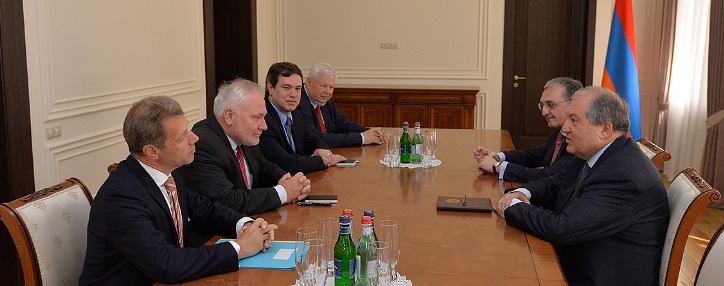Armenia’s remains committed to peaceful settlement of Karabakh conflict
14.06.2018,
15:21
Armenia’s President Armen Sarkissian received today the co-chairs of the OSCE Minsk Group Sergey Popov (Russia), Stefan Visconti (France) and Andrew Schofer (USA), as well as the Personal Representative of the OSCE Chairman-in-Office Andrzej Kasprzyk, the presidential press service reported.

YEREVAN, June 14. /ARKA/. Armenia’s President Armen Sarkissian received today the co-chairs of the OSCE Minsk Group Sergey Popov (Russia), Stefan Visconti (France) and Andrew Schofer (USA), as well as the Personal Representative of the OSCE Chairman-in-Office Andrzej Kasprzyk, the presidential press service reported.
It quoted Sarkissian as saying that Armenia remains committed to the Nagorno-Karabakh negotiation process mediated by the OSCE Minsk Group. He also noted that Armenia will continue the efforts aimed at a peaceful settlement of the conflict.
The Nagorno-Karabakh conflict erupted into armed clashes after the collapse of the Soviet Union in the early 1990s as the predominantly Armenian-populated enclave of Azerbaijan sought to secede from Azerbaijan and declared its independence backed by a successful referendum.
On May 12, 1994, the Bishkek cease-fire agreement put an end to the military operations. A truce was brokered by Russia in 1994, although no permanent peace agreement has been signed. Since then, Nagorno-Karabakh and several adjacent regions have been under the control of Armenian forces of Karabakh.
Nagorno-Karabakh is the longest-running post-Soviet era conflict and has continued to simmer despite the relative peace of the past two decades, with snipers causing tens of deaths a year. On April 2, 2016, Azerbaijan launched military assaults along the entire perimeter of its contact line with Nagorno-Karabakh. Four days later a cease-fire was reached. -0-
It quoted Sarkissian as saying that Armenia remains committed to the Nagorno-Karabakh negotiation process mediated by the OSCE Minsk Group. He also noted that Armenia will continue the efforts aimed at a peaceful settlement of the conflict.
The Nagorno-Karabakh conflict erupted into armed clashes after the collapse of the Soviet Union in the early 1990s as the predominantly Armenian-populated enclave of Azerbaijan sought to secede from Azerbaijan and declared its independence backed by a successful referendum.
On May 12, 1994, the Bishkek cease-fire agreement put an end to the military operations. A truce was brokered by Russia in 1994, although no permanent peace agreement has been signed. Since then, Nagorno-Karabakh and several adjacent regions have been under the control of Armenian forces of Karabakh.
Nagorno-Karabakh is the longest-running post-Soviet era conflict and has continued to simmer despite the relative peace of the past two decades, with snipers causing tens of deaths a year. On April 2, 2016, Azerbaijan launched military assaults along the entire perimeter of its contact line with Nagorno-Karabakh. Four days later a cease-fire was reached. -0-



